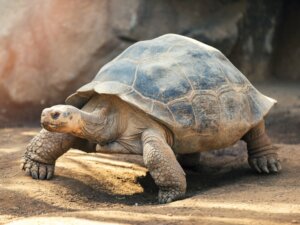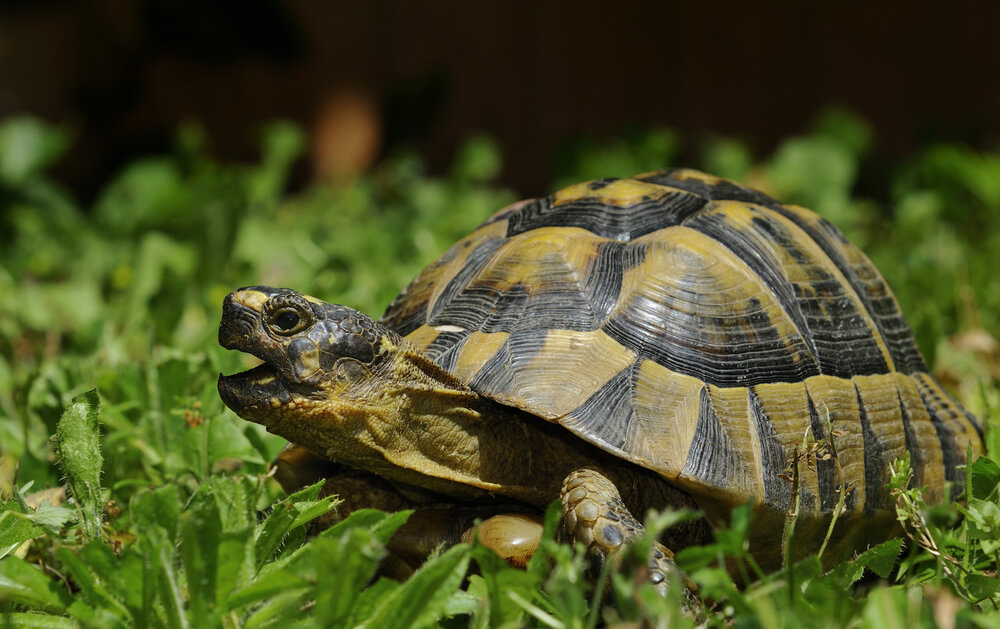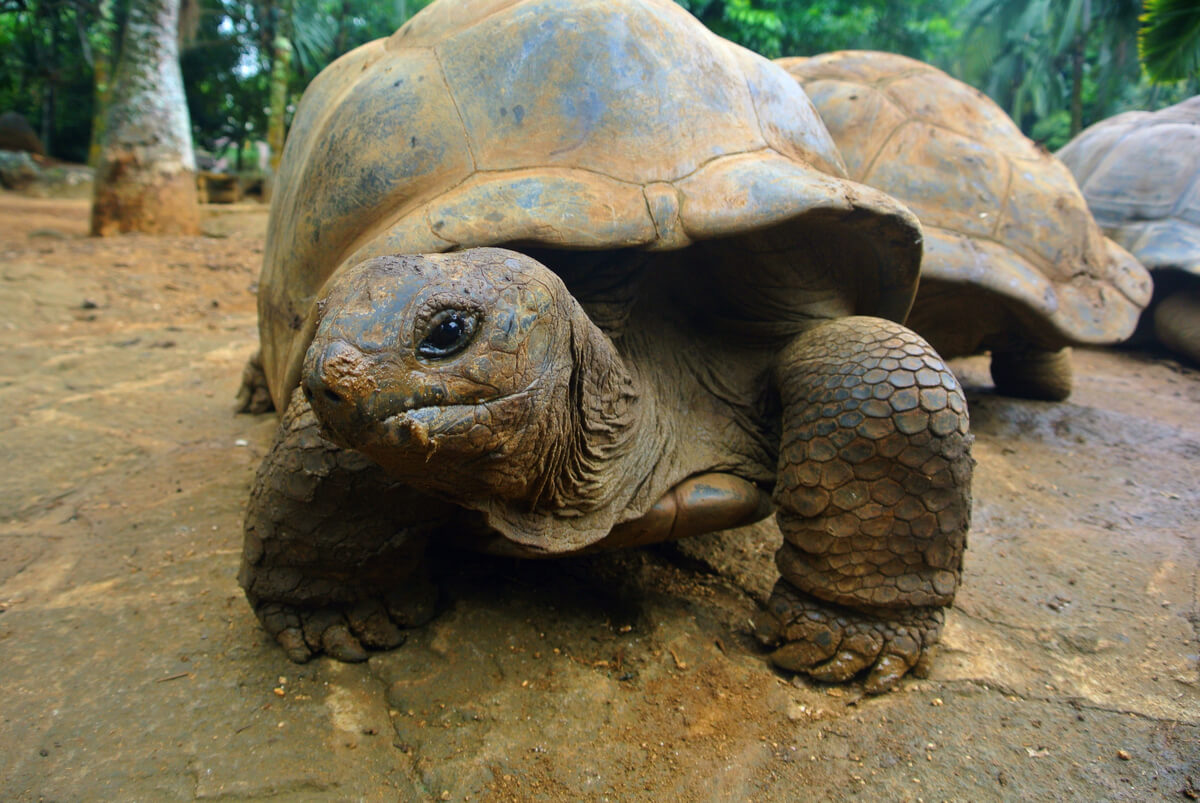Scientists Find Species that Don't Seem to Age


Written and verified by the biologist Cesar Paul Gonzalez Gonzalez
Aging is an inevitable biological process that interrupts the normal functionality of the body. As a result, different conditions appear, which worsen with the passage of time. Although this is quite evident in all living beings, a recent study has confirmed that there are some species that don’t seem to age.
This new discovery confirms several theories about some animals with great longevity. While this doesn’t mean that they remain young all their lives, it explains how it’s possible for certain species to surpass 100 years of age quite easily. Continue reading to learn more about this topic.
What is aging?
In general, metabolic processes generate a series of molecules that are toxic to the cell, which progressively deteriorate it. Thus, as time goes by, the damage accumulates and causes problems in the normal functioning of the body. As a result, the body’s tissues lose elasticity, wrinkles appear, and resistance decreases, which are signs of aging.
Metabolism can be understood as any biochemical reaction that allows life to be sustained. This means that if aging is to be avoided, all metabolic processes in the body must be stopped, which would inevitably lead to death. This is what makes aging unavoidable.
Why do living beings have different life expectancies?
Although there are certain similarities, the metabolic processes are different in each living being. Because of this, the speed at which toxic molecules are generated varies in each species, which causes aging to appear at different times.
However, although metabolism is one of the main factors responsible for aging, the environment and quality of life also affect this process. This is because any factor that affects the organism causes additional damage to the cells. Therefore, the aging process is accelerated.
The life expectancy of a species is dictated not only by the rate of its metabolism, but also by its way of life and the surrounding environment. That’s why the average life expectancy is only an indicator of the possible age the specimen can reach. However, it doesn’t ensure that the organism’s life will last to that point.

Species with great longevities
Although the metabolism, environment, and way of life of a species may be conducive to slowing down aging, the reality is that they do not stop it. Therefore, no animal is capable of living forever or achieving immortality. Nevertheless, there are some beings that surpass 100 years, which is incredible when several species have difficulty reaching 50 years of age sometimes (including humans).
Humans are perhaps the best example of how to fight against old age, as they have doubled their life expectancy in less than 100 years. Around 1930, people lived on average 34 years, while by 2019 this figure has increased to 75 years. Contrary to what one might think, this result is caused by medical advances that make it possible to remedy the consequences of aging, but not to not stop it.
On the other hand, there are magnificent species that, despite not having the ability to remedy the effects of aging, seem not to age. An example of this are several types of tortoises and turtles that regularly live to 60 years and can even reach 150 years of age.
Why can turtles live so long?
Although turtles don’t have the ability to medicate or cure themselves, they have a complex biological mechanism that helps them to have great longevity. For years, it was hypothesized that the metabolic process of these reptiles might be slower than that of other animals, giving them the ability to slow aging. However, there was no scientific study that affirmed or denied this fact.
In 2022, a study conducted by the University of Denmark found that several species of testudines (turtles) showed few signs of aging. In other words, of the 77 species of turtles analyzed, about 75% exhibited the ability to slow down the aging process. Some of the specimens analyzed were:
- Black-headed turtle (life expectancy: 20 years)
- Aldabra giant tortoise (life expectancy: 80-120 years)
- Galapagos tortoise (life expectancy: 100-150 years)
- Black marsh tortoise (life expectancy: 60 years)

Why don’t turtles age so fast?
There’s still no specific reason to explain why some turtle species seem not to age. However, some experts believed that it might have some relation to their inability to generate their own heat. As is well known, reptiles don’t regulate their body temperature and depend entirely on the sun for warmth. This means that their metabolism works less, which could slow down aging.
However, this was recently (2022) disproved by a large group of researchers. The study concludes that there’s no relationship between the aging of animals and their ability to regulate their temperature (ectotherms and endotherms). Therefore, there’s still no concise reason why several species of turtles don’t seem to age so fast.
If the secret behind the ability of these turtle species to avoid aging can be discovered, it could be used to improve human health in the future. Of course, there’s still a long way to go to find the necessary answers, but who knows if this could be one of the first clues to potential, or near, immortality.
Aging is an inevitable biological process that interrupts the normal functionality of the body. As a result, different conditions appear, which worsen with the passage of time. Although this is quite evident in all living beings, a recent study has confirmed that there are some species that don’t seem to age.
This new discovery confirms several theories about some animals with great longevity. While this doesn’t mean that they remain young all their lives, it explains how it’s possible for certain species to surpass 100 years of age quite easily. Continue reading to learn more about this topic.
What is aging?
In general, metabolic processes generate a series of molecules that are toxic to the cell, which progressively deteriorate it. Thus, as time goes by, the damage accumulates and causes problems in the normal functioning of the body. As a result, the body’s tissues lose elasticity, wrinkles appear, and resistance decreases, which are signs of aging.
Metabolism can be understood as any biochemical reaction that allows life to be sustained. This means that if aging is to be avoided, all metabolic processes in the body must be stopped, which would inevitably lead to death. This is what makes aging unavoidable.
Why do living beings have different life expectancies?
Although there are certain similarities, the metabolic processes are different in each living being. Because of this, the speed at which toxic molecules are generated varies in each species, which causes aging to appear at different times.
However, although metabolism is one of the main factors responsible for aging, the environment and quality of life also affect this process. This is because any factor that affects the organism causes additional damage to the cells. Therefore, the aging process is accelerated.
The life expectancy of a species is dictated not only by the rate of its metabolism, but also by its way of life and the surrounding environment. That’s why the average life expectancy is only an indicator of the possible age the specimen can reach. However, it doesn’t ensure that the organism’s life will last to that point.

Species with great longevities
Although the metabolism, environment, and way of life of a species may be conducive to slowing down aging, the reality is that they do not stop it. Therefore, no animal is capable of living forever or achieving immortality. Nevertheless, there are some beings that surpass 100 years, which is incredible when several species have difficulty reaching 50 years of age sometimes (including humans).
Humans are perhaps the best example of how to fight against old age, as they have doubled their life expectancy in less than 100 years. Around 1930, people lived on average 34 years, while by 2019 this figure has increased to 75 years. Contrary to what one might think, this result is caused by medical advances that make it possible to remedy the consequences of aging, but not to not stop it.
On the other hand, there are magnificent species that, despite not having the ability to remedy the effects of aging, seem not to age. An example of this are several types of tortoises and turtles that regularly live to 60 years and can even reach 150 years of age.
Why can turtles live so long?
Although turtles don’t have the ability to medicate or cure themselves, they have a complex biological mechanism that helps them to have great longevity. For years, it was hypothesized that the metabolic process of these reptiles might be slower than that of other animals, giving them the ability to slow aging. However, there was no scientific study that affirmed or denied this fact.
In 2022, a study conducted by the University of Denmark found that several species of testudines (turtles) showed few signs of aging. In other words, of the 77 species of turtles analyzed, about 75% exhibited the ability to slow down the aging process. Some of the specimens analyzed were:
- Black-headed turtle (life expectancy: 20 years)
- Aldabra giant tortoise (life expectancy: 80-120 years)
- Galapagos tortoise (life expectancy: 100-150 years)
- Black marsh tortoise (life expectancy: 60 years)

Why don’t turtles age so fast?
There’s still no specific reason to explain why some turtle species seem not to age. However, some experts believed that it might have some relation to their inability to generate their own heat. As is well known, reptiles don’t regulate their body temperature and depend entirely on the sun for warmth. This means that their metabolism works less, which could slow down aging.
However, this was recently (2022) disproved by a large group of researchers. The study concludes that there’s no relationship between the aging of animals and their ability to regulate their temperature (ectotherms and endotherms). Therefore, there’s still no concise reason why several species of turtles don’t seem to age so fast.
If the secret behind the ability of these turtle species to avoid aging can be discovered, it could be used to improve human health in the future. Of course, there’s still a long way to go to find the necessary answers, but who knows if this could be one of the first clues to potential, or near, immortality.
All cited sources were thoroughly reviewed by our team to ensure their quality, reliability, currency, and validity. The bibliography of this article was considered reliable and of academic or scientific accuracy.
- Reinke, B. A., Cayuela, H., Janzen, F. J., Lemaître, J. F., Gaillard, J. M., Lawing, A. M., … & Miller, D. A. (2022). Diverse aging rates in ectothermic tetrapods provide insights for the evolution of aging and longevity. Science, 376(6600), 1459-1466.
- da Silva, R., Conde, D. A., Baudisch, A., & Colchero, F. (2022). Slow and negligible senescence among testudines challenges evolutionary theories of senescence. Science, 376(6600), 1466-1470.
- Finch, C. E. (2009). Update on slow aging and negligible senescence–a mini-review. Gerontology, 55(3), 307-313.
- Girondot, M., & Garcia, J. (1999). Senescence and longevity in turtles: what telomeres tell us. In Proceedings of the 9th extraordinary meeting of the Europea Societas herpetologica (Vol. 1, pp. 25-29).
This text is provided for informational purposes only and does not replace consultation with a professional. If in doubt, consult your specialist.








